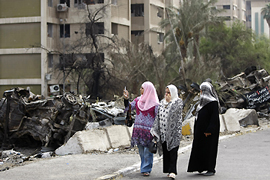Shia leader’s body arrives in Iraq
Abdul-Aziz al-Hakim, who died in Iran on Wednesday, expected to be buried in Najaf.

The funeral procession is expected to start in the Iraqi capital and make stops in several cities in the country’s southern provinces before burial in the Muslim holy city of Najaf.
From the airport the body was to be taken to the mausoleum of Imam Kadhim in the Kadhimiya shrine district of Baghdad.
It is later due to be taken to an official mourning ceremony in the fortified Green Zone, the seat of the Iraqi government and the US embassy.
Burial in Najaf
After the ceremony in the Green Zone, the body will be conveyed to the Shia Muslim shrine city of Karbala.
Al-Hakim is expected to be buried in Najaf on Saturday.
Fares Braizat, a director at the Social and Economic Survey Research Institute in Doha, said the next few weeks will be critical in determining who will fill the vacuum left by al-Hakim’s death.
|
“There will be a gap, and no one will be in a position to fill this gap. But there will be many contenders who try to fill this” Saad Jawad Qindeel, Iraqi MP and former head of political affairs for the Islamic Supreme Council of Iraq |
Al-Hakim’s Islamic Supreme Council of Iraq (ISCI) swept Shia areas in the first provincial elections after the US-led invasion of 2003, but in new elections this January the party suffered major losses.
“It is not clear yet whether his son will be succeeding him, although there are signs that he will be doing so,” Braizat told Al Jazeera.
“That needs confirmation and there is an internal process of elections they will have to go through.
“However, there remains the political instability in Iraq that will raise many questions of whether he will be able to play the same role as his father.”
Saad Jawad Qindeel, an Iraqi MP and former head of the ISCI’s political affairs, said it would be hard for anyone to follow al-Hakim and maintain the delicate position of being friendly with Iran and at the same time with the US.
“There will be a gap, and no one will be in a position to fill this gap. But there will be many contenders who [will] try to fill this,” Qindeel told Al Jazeera.
Al-Hakim helped to establish an opposition movement in 1982 while in exile in Iran to fight the Sunni-dominated government of Saddam Hussein, Iraq’s executed former leader.
He spent nearly two decades in Iran during Saddam’s rule and returned only after the 2003 invasion.
‘Deeply saddened’
Ayatollah Ali al-Sistani, Iraq’s most senior Shia religious leader, was deeply saddened by al-Hakim’s death, his office in Najaf said.
 |
| Al-Hakim’s death comes amid a surge in violence in Baghdad and other cities [AFP] |
“In deep sadness, Ali al-Sistani received the news of the death of his eminence scholar Abdel Aziz al-Hakim, who passed away after a life full of giving for the sake of his religion and country, and to save his people from despotism and injustice,” al-Sistani’s office said.
In Tehran, Ayatollah Ali Khamenei, Iran’s supreme leader, praised al-Hakim on Thursday as the symbol of the struggle against Saddam’s government.
“His death is a big loss for the Iraqi people and government, and is a painful incident for the Islamic Republic [of Iran],” Khamenei said in a message read at a ceremony in Tehran.
In Damascus, Bashar al-Assad, the Syrian president, expressed his “sincere condolences and sympathy” to his Iraqi counterpart, Jalal Talabani, and to the people of the country.